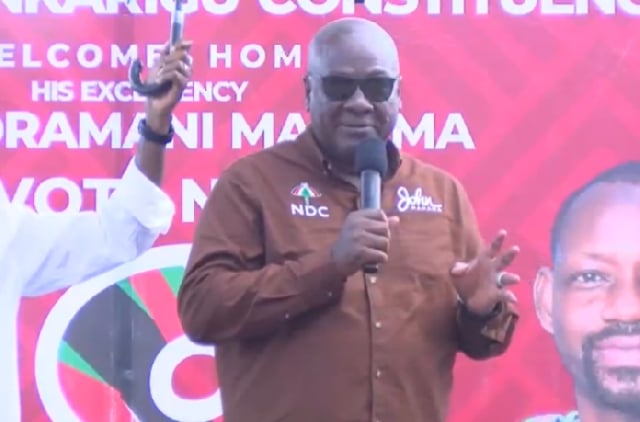In his campaign for the 2024 presidential elections, John Mahama, the candidate for the opposition National Democratic Congress (NDC), has urged Ghanaians to reject the New Patriotic Party (NPP) due to what he describes as its poor governance over the past eight years. Speaking to constituents in Wa West, Upper West region, Mahama painted a stark picture of the current government’s performance, asserting that they have failed to improve the nation’s economy and overall living conditions for its citizens. He appealed to voters to remember the struggles they have faced and to consider the track records of both major political parties. Emphasizing the need for accountability, Mahama argued that a continuation of NPP governance would signal that any party could mishandle the economy and still achieve electoral success.
He highlighted the importance of the citizens’ engagement in the electoral process, asserting that the choice they make could have significant implications for the nation’s future. Mahama encouraged the gathering to actively partake in the political discourse and not to remain passive in the face of governmental failures. He condemned the trend of political impunity he perceives in the current administration, urging Ghanaians to stand together and demand better governance. Mahama’s call to action sought to inspire a united front among voters, fostering a collective responsibility to influence future political decisions.
Mahama took a particular interest in addressing the younger demographic within the audience, conveying that they should not settle for inexperienced leadership that lacks a comprehensive developmental vision. He underscored the unique challenges that the youth face and reiterated his belief that they deserve a leader who is both experienced and sincere. This appeal resonates deeply as Mahama aims to connect with younger voters who may be disillusioned by the current political climate. By framing his campaign as a movement towards progressive leadership, he seeks to foster a sense of urgency among the youth to drive change.
During his address, Mahama made a point to contrast his leadership style with that of his opponents, emphasizing honesty as a critical trait of effective governance. He argued that political promises should be substantiated with action and not just rhetoric. This notion of truthfulness and integrity in leadership is central to his campaign messaging as he seeks to position himself as a trustworthy alternative to the NPP. By showcasing his past experiences in both government and opposition, Mahama aims to reassure Ghanaians that he possesses the necessary skills and insight to lead effectively.
In articulating his vision for Ghana, Mahama pledged to lead a government dedicated to economic profitability and enhanced social welfare. He reinforced his commitment to addressing the pressing concerns of the citizenry, offering a perspective of hope and progress if elected. His experience, he argues, is a vital asset that will allow him to enact policies that can uplift the standards of living across the nation. By focusing on pragmatic solutions rather than mere promises, he seeks to establish credibility with the electorate.
Overall, Mahama’s campaign message is rooted in a stark critique of the NPP’s governance, an appeal for civic responsibility, and an emphasis on the need for experienced and honest leadership. As Ghanaians prepare for the upcoming elections, the call for accountability and the demand for better governance resonate strongly in his narrative. In his view, the future of Ghana hinges on the choices made during this electoral cycle, and he appeals to the collective consciousness of the populace to make decisions that reflect their aspirations for a more prosperous and equitable society.














